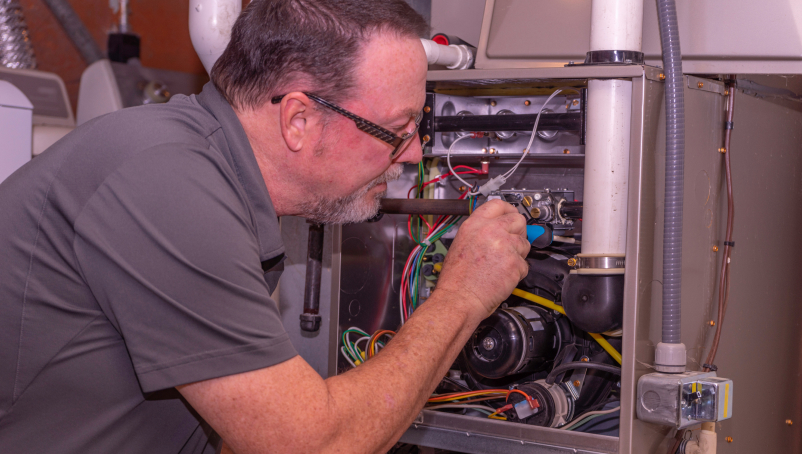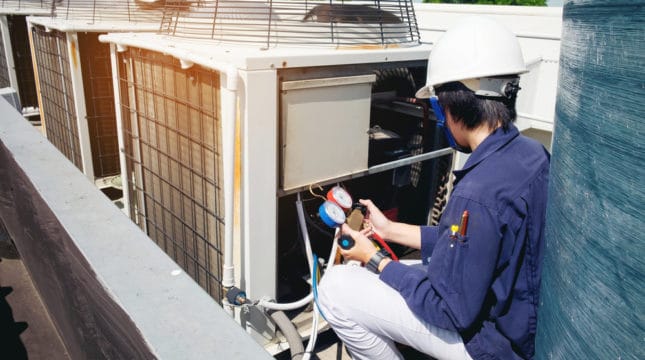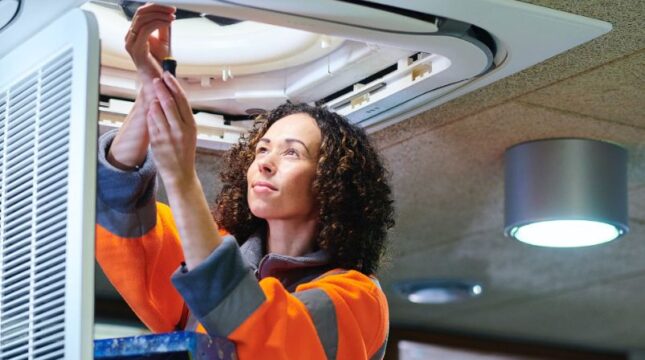Do you need a Minnesota HVAC license?
Minnesota does not require HVAC professionals to be licensed at the state level, but most cities have local licensing requirements. Check with local municipalities where you plan to operate for requirements.
Environmental Protection Agency (EPA) Section 608 certification
While there is no state-level licensing, if you will be working with refrigerants, you must get the federally mandated EPA Section 608 certification. To get this certification, you must pass a certification exam and pay an exam fee.
There are four types of EPA certifications for refrigerants:
- Type I for small appliances
- Type II for high-pressure units
- Type III for low-pressure appliances
- Universal for all HVAC systems and appliances covered under these types.
Exams are tailored to the equipment you want to work with and must be administered by an EPA-approved certifying organization. Once you get this certification, you’re good to go; credentials don’t expire.
If you’re part of an HVAC apprenticeship program, you’re exempt from certification requirements as long as a certified technician continuously supervises you.
Insurance for HVAC contractors in Minnesota
To get your HVAC license, you need the right business insurance coverage. Besides being required for some licenses, HVAC contractor insurance can help protect your business from financial losses if something goes wrong on one of your jobs.
General Liability insurance
Minnesota general liability insurance can help protect your business if you or one of your employees damages someone’s property or injures someone who isn’t an employee.
To work as an HVACR contractor in the state, you must have liability insurance coverage. Coverage amounts vary based on where you operate your business.
For instance, in Minneapolis, license holders must carry the minimum liability coverage of $100,000 per occurrence and $300,000 in aggregate for bodily injury and property damage. Those in St. Paul must have $500,000 for bodily injury and property damage combined.
Learn more about general liability for contractors.
Workers’ Compensation insurance
Most Minnesota HVAC licensed contractors with employees must have workers’ compensation insurance, which can help cover medical expenses and lost wages for employees who get sick or injured on the job.
If you don’t have employees, you usually must sign an exemption waiver or explain why you’re exempt. Even if you don’t have employees, you may want to consider purchasing coverage. Under Minnesota law, subcontractors are sometimes considered employees.
Learn more about workers’ comp for construction workers.
Commercial Property insurance
If you lease or own a business property, commercial property insurance can help provide coverage if your business property — including furniture, equipment and inventory — is damaged or vandalized. It also can help protect you against losing business income and related expenses if you temporarily close due to a covered event.
Business Owner’s Policy
A business owner’s policy, or BOP insurance, provides broad coverage of general liability and commercial property policies combined in a single, cost-efficient bundle. It can help cover damage that you or your employees may accidentally cause to another person’s property and help protect your business equipment in the event of a fire or other covered event.
Tools and Equipment insurance
Tools and equipment insurance can help cover repairs and replacements if your work gear is stolen or damaged. While the state does not mandate this coverage, it helps ensure your gear is always protected — including in your vehicle, stored in a trailer or at a job site.
Learn about tools and equipment insurance.
Commercial Auto insurance
Every vehicle on the road in Minnesota must have insurance coverage. Personal auto insurance doesn’t usually cover work-related activities, so commercial auto can help cover accident-related costs, such as towing, repairs and rental reimbursement.
In MN, the minimum required coverage is $30,000 (injuries to one person — bodily injury), $60,000 (per accident) and $10,000 (physical damage to other vehicles or property).
How to get an HVAC license in Minnesota
While there is no state licensing requirement, many local licensing agencies have similar requirements. Check your town’s trade license department for the official requirements, but get an overview of a typical process here.
1. Review types of licenses available
Because the state doesn’t oversee licensure, check with the cities or counties where you plan to work for local license requirements. For instance, HVAC technicians and contractors in Minneapolis and St. Paul have different license types.
In Minneapolis, there are these two licenses for HVAC contractors (not including specialized mechanical contractor licenses such as refrigeration or gas fitters):
- Class A. For contractors who install, fix or clean heating, air conditioning and ventilation systems.
- Class B. For contractors who clean heating, air conditioning and ventilation systems.
In St. Paul, there are several trade licenses related to HVAC work:
- Gas or oil-burning
- Refrigeration
- Steam Fitting
- Warm Air/Ventilation
Work with local licensing departments to understand the requirements for the license you want.
2. Have a competency card
A competency card proves that the cardholder has the training, experience and technical knowledge to install, alter, repair and service equipment. Many local authorities will require a competency card to issue a license.
To get a competency card, you must be at the journeyman or master level. However, the applicant must usually hold a master-level competency card to get a trade license.
Master-level competency card requirements include the following:
- Hold a journeyperson certificate of competency for at least one year or be a registered mechanical engineer.
- Must have two notarized signatures from masters of the trade or craft.
To get the card, you must:
- Apply to take the certification exam. Applicants must submit an application form with documentation for related education, training and work experience.
- Be authorized to take the certification exam. After submitting your application package, if approved, the examination board/city staff will send an authorization letter to schedule the exam.
- Take the exam. Select the exam required for your license. Most exams are open-book with 80-100 multiple-choice questions.
- Pass the exam. You must pass the exam with a 70% or higher.
If you have a City of Saint Paul competency card, you can use it to expedite your license application for a Minneapolis card and vice versa.
3. Get surety bonds
Surety bonds are frequently required for contractors and construction professionals to obtain work from government agencies and property owners. A bond helps protect customers if a contractor fails to complete a job contract.
While no HVAC or mechanical contractor state license exists, the Minnesota Department of Labor and Industry requires bonding for mechanical contractors. Businesses must file a $25,000 mechanical contractor surety bond to perform HVACR work legally. Here’s the State of Minnesota bond form.
Municipalities may also have local bonding requirements, depending on the type of license you’re applying for. For instance, if you are applying for a Class B HVAC license in Minneapolis, you can get a $25,000 state bond or a City bond for $10,000.
4. Get business insurance
Most local authorities require HVAC license applicants to have liability insurance. However, the coverage amounts may vary.
For instance, all Minneapolis HVAC license holders must produce a certificate of insurance with the minimum liability coverage of $100,000 per occurrence and $300,000 aggregate for bodily injury and property damage.
However, in St. Paul, you need to have $500,000 for bodily injury and property damage combined. Duluth has no insurance requirement, just the state’s mechanical contractor bond requirement.
Regardless of where you operate, you must purchase workers’ compensation insurance if you have employees. If you do not have employees, you must certify it on your application or get a coverage waiver.
5. Submit your application and pay the fees
Depending on the municipality, you must submit your license application online, via mail or in person. Follow the instructions on the licensing department’s website for the application submission process.
License fees vary. Here are the fees for several cities:
| City | License application fee |
| Minneapolis | $285 + $140 new license processing fee |
| St. Paul | $188 |
| Rochester | $112 |
| Bloomington | $75 |
| St. Cloud | $132 |
HVAC license renewals
License renewals vary by municipality. Most contractor licenses are valid for a year and must be renewed annually.
Licenses expire one year from the issue date in Minneapolis, but in St. Paul, they expire yearly on December 1st. Check with your local authority to stay licensed.





